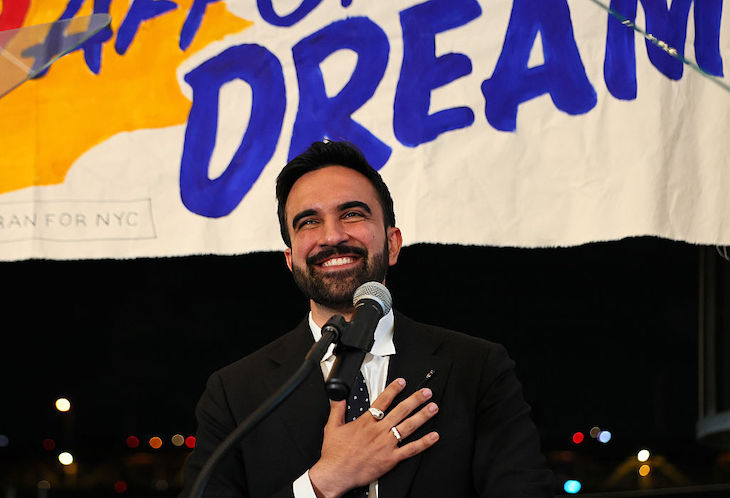Mass appeal
Sir: The upcoming ‘rave’ at Peterborough Cathedral follows the trajectory of using this sacred space as a mere entertainment venue (‘Raving mad’, 14 September). Previous secular attempts to commercialise include ‘experiences’ of the moon, dinosaurs, the deep sea and light shows.
I assume the rave organisers did not witness the cathedral in June when a Saturday evening vigil mass was celebrated by the Catholic Bishop of East Anglia for local Catholics. When used for its original and sacred purpose, Peterborough Cathedral was filled with Catholics participating in the divine liturgy. Many were standing for want of seats, like some of our churches on Sundays.
It was worth renting out the cathedral, not only to celebrate mass with other Peterborough Catholics, but to show what was and what could have been had England stayed on the narrow path. While I agree with Douglas Murray that it is awe-inspiring to see the building when empty, it is abundantly more uplifting to see the cathedral rightly filled.
Simon Charles Elliott
Peterborough
Class act
Sir: Claude Elliott, the former provost of Eton, may have described the teaching of English as ‘Jeans and homosexuality’ (Notes, 14 September) but he did give permission for a play production, albeit with the proviso that ‘It should not be too good’. Neither was he musical: overhearing the choir practising a descant, he assumed there was a riot and tried to restore order.
Rhidian Llewellyn
London SW14
Poll position
Sir: You assert in the Diary (14 September) that The Spectator doesn’t endorse candidates. This is doubtless true. Yet as secretary I recall your predecessor Dominic Lawson informing the board at its quarterly meeting in March 1992 that he had arranged to bring forward by two days the publication date that would otherwise have coincided with the general election on 9 April. This, he explained, would allow him to offer readers guidance on how to cast their votes.
One of the directors, Norman Tebbit, asked if the editor would care to take the board into his confidence. Lawson provided the expected reassurance. However, when it came to the issue immediately before the election, it included only nuanced support for the Conservatives. Simon Heffer, described in the strapline as intoxicated by the exuberance of Mrs Thatcher’s verbosity, reported how in Maldon High Street she had ‘lectured bewildered passers-by about the iniquities of socialism… Mr Major was mentioned only in a recherché reference to his superiority to the other two party leaders when being interviewed on television; the government’s policies of the last 16 months not at all’.
Anthony Rentoul
Twickenham
Fruit loop
Sir: In his recent review of Sally Coulthard’s The Apple: a Delicious History (Books, 17 August), Pen Vogler refers to ‘Milton retrofit[ing] the apple to the Bible’s generic “fruit of the tree of knowledge”, making the most of the Latin malus for apple and evil’. In fact, malus means apple tree; the Latin for apple is malum with a long ‘a’, whereas evil is malum with a short ‘a’, and the two words are unrelated.
While in western Christianity the tree is taken to be an apple tree and the fruit an apple, the Garden of Eden story in Genesis doesn’t in fact mention an apple tree or that Adam and Eve ate an apple. Down the ages, various other fruits, such as the grape, the fig and the pomegranate, malum granatum in Latin, have been suggested as being the forbidden fruit. Certainly, though, it’s easier to say ‘Adam’s apple’ than ‘Adam’s pomegranate’ in memory of the fruit that supposedly got stuck in Adam’s throat.
Richard Symington
London SW1
Case history
Sir: Mark Palmer is right to extol the virtues of briefcases but also a caution that goes with it (Notes on backpacks, 7 September). For years I carried all my valuables in a plastic bag on the premise no one would nick it. Then, interviewing an eminent Parisian 20 years ago, he remarked: ‘How unprofessional!’ Off I went to the Rue Saint-Jacques and spent £150 on a leather satchel. Recently in Barcelona I was robbed of my faithful companion (passport, mobile and specs inside) in broad daylight. Mark Palmer wants the return of the briefcase. So do I.
Rory Knight Bruce
Crediton, Devon
A problem shared
Sir: Melissa Kite’s article about the sharing of tales of surgical procedures (Real life, 7 September) struck a chord. My husband and I are in our seventies and enjoy the company of friends within our age group. Whenever we meet up, a ritual conversation has to take place before getting on with analysing politics or bemoaning the state of the world: one that has affectionately become known as an ‘organ recital’. It’s a sort of disease-resistant Top Trumps. Sharing our medical and surgical experiences enables us to deny the inexorable march of time and reduce the threat of life-shortening illnesses to that of a minor irritation that we can easily live with. It’s a sort of survival tactic – not hypochondria but quite the opposite. It’s what keeps us going.
Janet Cardell
Potters Bar, Hertfordshire
Munich’s men
Sir: I do not wish to be pedantic over such a tragedy as the Munich air disaster, but Ian Sansom’s otherwise excellent and sensitive review of Munichs by David Peace (Books, 14 September) incorrectly stated that Danny Blanchflower had been rescued from the wreckage by Harry Gregg, when it should have referred to his younger brother Jackie Blanchflower as having had his life saved.
Michael Dixon
Sunderland, Tyne and Wear







Comments